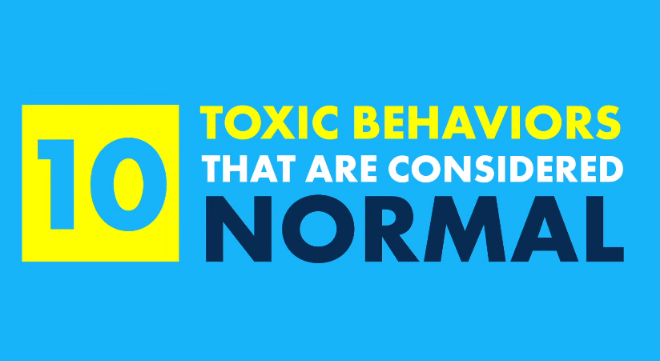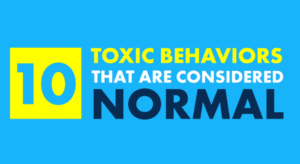We will learn about ten toxic behaviors that are considered normal.
What behaviors separate toxic people from everyone else?
The word “toxic” is often overused and misunderstood. In some contexts, this person may be genuinely toxic. They may bring harm to the people around them. In other contexts, they might be helpful, altruistic, and kind-hearted.
We pretend that only the worst, most manipulative people are guilty of toxicity, but many toxic behaviors are far more common than people would like to admit. In fact, a significant percentage of social norms do more harm than good.
So, why are some toxic behaviors considered normal? Why aren’t more people raising concerns and making efforts to change? Well, most people do not realize that they are part of the problem. We are psychologically predisposed to think of ourselves as immune to the problems and temptations that other people face.
Instead of considering our own toxic habits, we scrutinize and blame other people, even if most of us are guilty of the same mistakes. Of course, that doesn’t mean the world is full of bad people or that society as a whole is programming us to be toxic.
The underlying problem is this: You’re just doing what everyone else is doing. You assume your choices and habits are normal and good, but if you look closely, you may discover these ten toxic behaviors are more harmful than you realize.
1. Social Masks
Do you wear a mask around other people?
It’s normal nowadays to change our personalities in different social situations. You may act like a different person at work, around your friends, or with your partner. You may feel like you’re constantly switching your interests and your temperament wherever you go.
If you’re accustomed to “acting” around other people, you are not alone. It’s something most of us do every day, but that doesn’t mean it’s positive or healthy. In fact, it makes many people feel insecure about their actual selves.
It may feel like putting on a mask is necessary to be liked or respected, but most of the time you’re covering up the best parts of yourself.
2. Playing the Caretaker
Do you take care of everybody’s needs before your own?
Let’s say you’re hosting a gathering of friends and family. You may spend the entire evening checking on your guests, preparing food, and refilling empty drinks.
Before you know it, the party is over, and you didn’t get a chance to relax or enjoy a single minute of it. We sometimes call this “being a good host,” but what you’re really doing is catering unnecessarily to the people around you.
When you get into the habit of catering to others, you unconsciously neglect your own wants and needs. You forget to enjoy the fruits of your labor because you’re so worried about other people.
3. Chasing the Spotlight
More than ever, people want to be the center of attention. So many individuals, especially younger people, base their entire lives around standing in the spotlight, but it isn’t always good to be the center of attention.
In simple terms, chasing the spotlight often damages your self-esteem and self-worth. When you depend on other people for praise and validation, you lose the ability to praise and validate yourself.
For a few minutes, it may feel wonderful to stand in the spotlight and be the center of attention, but this kind of external validation can be more toxic than you realize.
4. False entitlement
It’s become normal within our society to expect a certain amount of fairness, comfort, and leeway in our lives. When we do something wrong, we believe we deserve a second chance. When we enter a lottery, we think that we deserve to win. We expect to beat the odds, even when they are heavily in our favor.
But the truth is, you never deserved to succeed in the first place. This false sense of entitlement sets you up for failure and disappointment in every aspect of your life. It creates unrealistic expectations, encouraging you to expect the extraordinary and deny the ordinary.
If you think you deserve more than other people, it’s time to change your perspective. Because false entitlement is much more toxic than you realize.
5. Unwanted Opinions
Have you ever received advice from someone without asking for it?
Many people like to give their opinions on other people’s styles, careers, and lifestyle choices. These people assume the whole world needs to hear what they have to say, even if no one asks for their advice. If you’ve ever been on the receiving end of this toxic habit, you know just how frustrating it can be.
An unwanted opinion can ruin your day or reopen old wounds, all because someone else needed to force their ideas onto you. Whenever you get unwanted advice, remember this: These people don’t understand your situation. They think they do, and they assume they know better than you.
But they really don’t. By giving uninformed advice, they’re making quick and inaccurate judgment calls, which can be hurtful, destructive, and ignorant. If you’re guilty of this toxic habit, here’s a good rule of thumb: If someone wants your advice, like a friend or family member, they’ll ask for it.
Otherwise, keep your opinions to yourself. You may think someone needs to hear what you have to say, but 95% of the time, you’re giving advice about things you don’t understand.
6. Emotional therapy
Have you ever felt like a therapist for someone in your life? Whether you’re struggling with a major problem or just searching for answers, you may find it helpful to meet with a trained professional—someone who gets paid to talk through difficult experiences and emotional conflicts.
Unfortunately, many people are resistant to seeking out professional help. Instead, they dump their problems onto their friends, family, and sometimes even strangers. This can be toxic for everyone involved. For those struggling, you may never get any closure or end up repeating the same toxic patterns.
For the people listening, you may feel like you have no voice in your relationship or gradually become exhausted by your friend’s negativity. Either way, this very common mistake can create serious problems for you and your relationships.
7. Vengeful Satisfaction
Many people take pleasure in acts of revenge. When someone does something wrong, we encourage each other to get back at them in clever and manipulative ways, and we gain satisfaction from witnessing their comeuppance. But is taking revenge really the right thing to do?
No matter how satisfying it sounds, making someone else suffer is always going to be a poor decision in the long run. Your satisfaction will be short-lived, and you won’t undo the damage done.
All you’re doing is creating more hardship. It may not feel as good in the heat of the moment, but the best thing you can do in almost any situation is to forgive and move forward.
8. Constant complaining
Do you know someone who’s constantly complaining?
For some reason, it is normal in our society to see the worst in every situation. People look for problems everywhere they go. They’re hyper-critical of everything and everyone, and they complain more often about what they don’t have than they appreciate what they do have.
Not only is this toxic behavior frustrating and disheartening, but it can also be toxic to you and the people around you. The more you focus on problems and shortcomings, the harder it is to find happiness and satisfaction in your life.
Even though everyone complains, be the one positive person you know, because your happiness depends on it.
9. Avoiding responsibility
Nobody but you is responsible for your decisions. When you make a mistake, it’s because you came up short. If you miss a deadline, it’s because you fell behind. Yet many people try to blame anyone but themselves. The explanation behind this toxic behavior is simple.
When you pass the blame, you don’t have to bear the consequences. For example, if you fail a job interview, you might blame the interviewer instead of reflecting on your behavior. If you’re unable to take responsibility for your mistakes, you’ll never learn from them.
If you never learn them, you’ll keep repeating those mistakes again and again. As often as you can, accept responsibility and identify your mistakes, because there is always room for improvement.
10. Critical Judgment
It’s easy to judge other people, but that doesn’t mean you should. Most of the time, when we criticize people, we do it to validate our own choices and opinions. It makes us feel better to put them down because we feel better by comparison.
Unfortunately, that superiority is both imaginary and short-lived. There’s nothing valuable or uplifting about criticizing another person. All you’re doing is hurting their self-esteem and putting a bandage over your own.


















